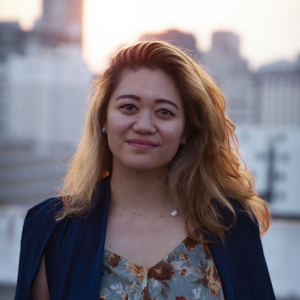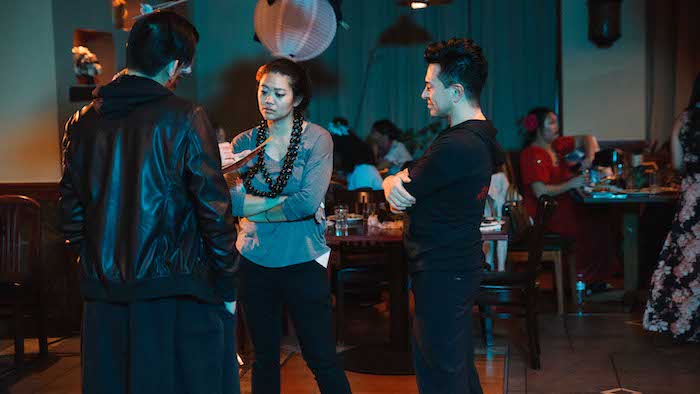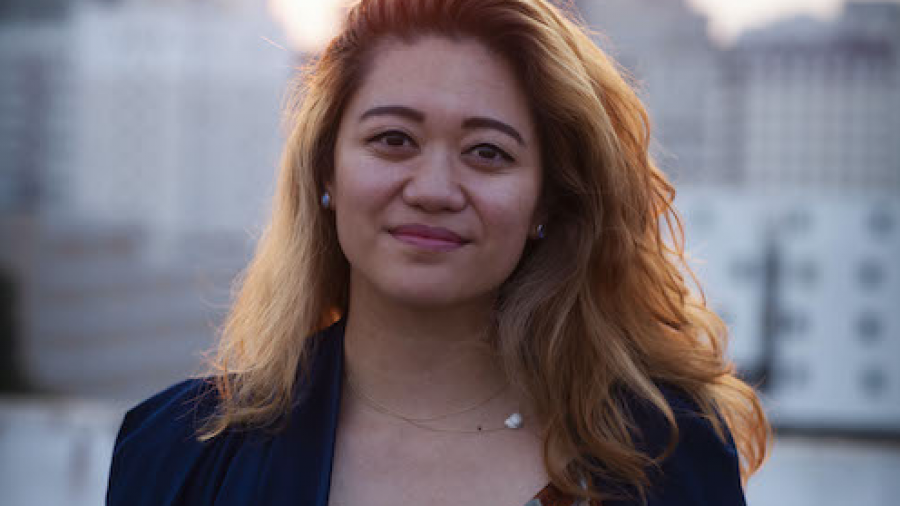Written by Jonah Azurin

Mallorie Ortega is busy. She wrote, produced, and directed her first feature film, The Girl Who Left Home, in just four years and she’s producing a few projects during the pandemic. Her film premiered in October during Filipino American History Month and the success has been empowering. In our interview, Mallorie talks about The Girl Who Left Home and her journey to produce the film.
Congrats on The Girl Who Left Home! How did the movie originate?
It really came from me wondering what it would be like to take my mom out to a bar. You’ll see that’s what happens in the movie. The story is about a family grieving about the loss of Christine’s father but when they finally get to take a break from the mourning, they go out. I was like, “It would be funny to bring her to a speakeasy,” and that’s kind of where my whole idea started. If there weren’t any social barriers between my mom and myself and we could just be honest with one another, what would that look like? What secrets could we share? How could we understand one another as a Filipino and a Filipino-American, you know? It’s a different culture being a Filipino in America and a Filipino-American. That’s how it was for me growing up. It was a constant struggle with cultural identity, and I wanted to make this film about addressing those things; not to say who’s right or wrong but just to get a better understanding of one another.

Behind the scenes of The Girl Who Left Home.
Definitely. I’m sure a lot of people can relate to this story. How long did it take for you to make this film?
It’s been 4 years now. When I first wrote it, I was in my last year of grad school at University of Southern California (USC) School of Cinematic Arts. After graduating and pitching to various producers and companies, it was clear they weren’t going to give me a shot [to make The Girl Who left Home]. A lot of my mentors were like, “I really need a feature film. We really like you, but no one gets considered unless they have a feature film under their belt.” That’s what propelled me to make it. Through those 4 years, we did a lot of crowdfunding and then finally I started my own production company to get investors and sponsors involved. Then we shot the movie in 2018 and here we are.
How did you get into filmmaking?
I’ve always known that I’ve wanted to do it, since I was very young. I was always in the theatre club growing up. Finally when it came to college, I wanted to major in Film and TV. But you know Filipino parents. Like, “Why don’t you become a nurse, maybe the military or business school?” and I’m like, “I don’t have that type of brain and I don’t want to.” So I essentially saved money, bought my own MacBook computer, started making little films in my last year of high school, and secretly applied to art schools. I’m the fourth child out of five children so you have to fend for yourself. When applying to the University of Maryland Baltimore County (UMBC), their film program called me and was like, “Hey! Apply for our scholarship.” I was lucky to get a full ride, and my parents couldn’t say “no” to that! After UMBC, I wanted more, and with another stroke of luck, got into USC School of Cinematic Arts, and have been in the business ever since.
So why musicals?
Oh, I love musicals! When I was in film school and wanted to be a serious director, I got really sad and needed music back in my life. My thesis film at USC is called Mango Sticky Rice [and that’s] where I ended my Master’s career. I was on a high and wanted to make another musical, which is when I wrote The Girl Who Left Home.

Behind the scenes on the set of The Girl Who Left Home.
How do you see the pandemic changing the film industry?
I feel like right now, no one knows anything. They’re only now gathering data because there are some theatres open, trying new subscription models. And you know, I’m embracing it because COVID-19 isn’t going away, but at the same time what has been really awesome about this experience is meeting you, and other filmmakers from across the world that I probably wouldn’t have met. And a lot of veteran filmmakers are suddenly available to have chats like this. So that’s been really cool about the pandemic because everyone is so eager to talk to people and meet other people – [they] feel creative and normal. We’re all able to oddly be more connected than ever before.
What advice would you give to aspiring artists?
I would tell everyone to make that thing you want to make no matter what. Even if you or other people think it’s bad, just make it. My friends are scared to finish the script or to shoot something because they’re very careful and protective over their work. Perfection isn’t real. You’re continuously evolving. What’s intimidating about film is that it takes a long time and it takes a lot of people; sometimes it takes money. I think people are scared of that type of commitment. You can’t get to where you want to be unless you make that first mistake, then the second, the third, and keep going. I just encourage everyone to make the thing that they want to make then find the people who believe in you and your story. It’s really important to find those people who genuinely support you and your voice.
It’s a balance of patience and hard work. Continuously going for the goal but trying not to be discouraged by how daunting it could be. Start off with a short film, work on your storytelling chops. You can shoot it on your iPhone – people say it all the time but it’s so true. You can edit and find out how much more you need to learn, and it still costs zero dollars. How amazing is that? There is no monetary pressure to be perfect when you’re shooting on your phone or a DSLR. There’s never a right answer and you’re never too young or old to try, so I say go for it.
Be sure to connect with Mallorie on Instagram and check out The Girl Who Left Home on Facebook and Instagram.

Mallorie Ortega directing The Girl Who Left Home.

